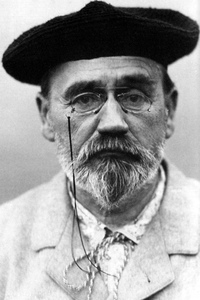Émile Zola 1840—1902
Émile Édouard Charles Antoine Zola was a French writer, the most well-known practitioner of the literary school of naturalism and an important contributor to the development of theatrical naturalism. He was a major figure in the political liberalization of France and in the exoneration of the falsely accused and convicted army officer Alfred Dreyfus, which is encapsulated in the renowned newspaper headline J’accuse. Zola was nominated for the first and second Nobel Prize in Literature in 1901 and 1902. During his early years, Zola wrote numerous short stories and essays, four plays and three novels. Among his early books was Contes à Ninon, published in 1864. With the publication of his sordid autobiographical novel La Confession de Claude attracting police attention, Hachette fired him. After his first major novel, Thérèse Raquin, he started the series called Les Rougon Macquart, about a family under the Second Empire.
















